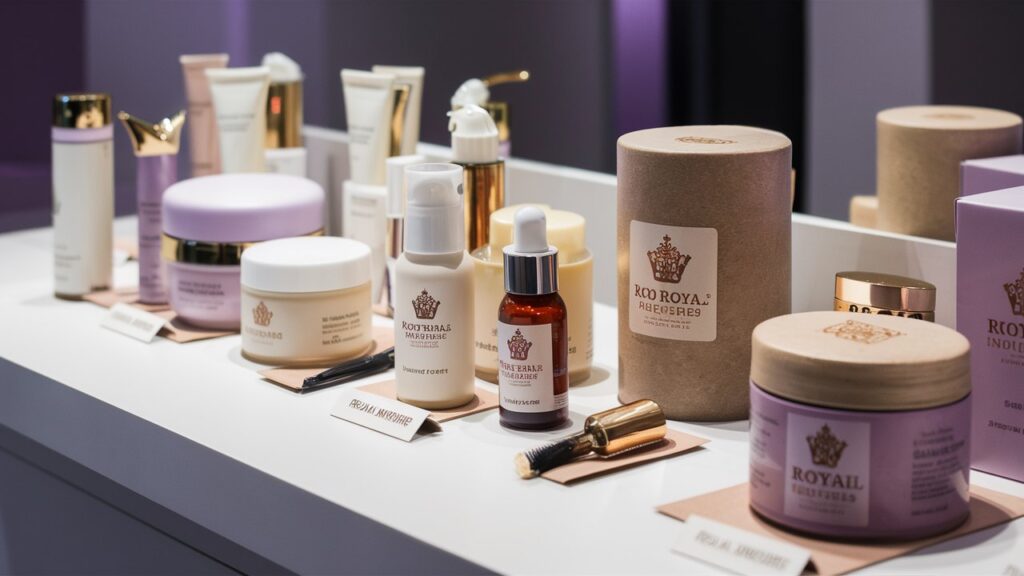Does your cosmetic brand need a reliable and efficient manufacturing solution? Cosmetics contract manufacturers benefit businesses of all sizes. Drug manufacturers strive for product excellence. It also applies to cosmetics manufacturers. They always do outstanding research on addressing people’s wants to change things.
Business dealers planning to provide cosmetics can find the proper third-party manufacturing company. This company effectively meets your needs, listed for clarity. If you’re looking for the best third-party cosmetic manufacturers in India, then let me show you that working with a third-party cosmetics manufacturer could change your game.

Growing Need in India for Cosmetic Products
Indian cosmetics are worth USD 24.53 billion and are predicted to reach USD 33.33 billion by the decade’s end. Thus, the personal and cosmetic product industry’s CAGR is 6.32%. More women are joining the job, and social media normalises men’s grooming and self-care, driving demand for safe cosmetics. Consumer behaviour has also changed due to the pandemic.
The Indian e-commerce boom has increased the demand for cosmetic, dermatology, and makeup products.
- Customers want organic, chemical-free, and Indian-climate-friendly.
- Social networking boosts cosmetics demand.
- More women working has affected cosmetics demand.
- More disposable money boosts cosmetics demand.
Therefore, India is a vast market for beginning a cosmetic brand nowadays. Many established Indian brands benefit from e-commerce, which allows you to create a cosmetic and dermatology business.
Over $4.4 billion in cosmetics are sold exclusively online via social media and e-commerce. Some independent groups found that price is one of many determinants in cosmetic purchases. It comes last, after skin, fragrance, hair, and usage.
Operations of Third-Party Cosmetic Manufacturers
Let’s examine these Third-Party Cosmetic Manufacturers operations and their impact on India’s beauty landscape.
Cost-Effective Solutions for Brands Big and Small
Third-party cosmetic makers benefit from economies of scale. Contract manufacturers can save money by bulk-purchasing raw materials, streamlining processes, and optimising resource use by combining production for several clients. This cost-effectiveness appeals to smaller firms and startups that need help to afford dedicated manufacturing facilities.
Third-Party Cosmetic Manufacturers have modern equipment and infrastructure to produce cosmetic goods efficiently and consistently. These contract manufacturers have the experience and technology to meet market demands for skincare and cosmetic products.
Regulatory Compliance and Quality Assurance
In the cosmetics industry, consumers’ safety and quality are guaranteed by strict regulations. This intricate regulatory mechanism obliges third-party manufacturers to ensure that their customers’ products comply with all the laws and rules.
Contract manufacturers follow stringent testing protocols and adhere to the Good Manufacturing Practices (GMP) set out by regulatory bodies such as BIS and DCA. Through collaboration with well-known third-party manufacturers, companies can guarantee that their products are compliant and of superior quality.
Continuous improvement and innovation in a competitive market of Third-Party Cosmetic Manufacturers.
Innovation is the key to successfully operating your cosmetics business in a fast-moving and competitive market and thus attracting customers. Third-party manufacturers realize this and invest in R&D departments to invent cutting-edge formulations, discover new ingredients, and integrate new technology.
Brands can get new products on the market earlier and thus outperform the competition by collaborating with contract manufacturers who provide them with knowledge and capabilities.
Moreover, third-party manufacturers provide valuable information about upcoming trends, consumers’ preferences, and market dynamics, which helps companies make informed choices and stay ahead of the competition.
Adapting to Fluctuating Demands with Agility
In the cosmetics industry, there is a correlation between season switching, new offerings, and personal choice. This is just one of the ways these third-party manufacturers can offer businesses the flexibility and scalability that are often required to meet their changing needs.
Third-Party Cosmetic Manufacturers can quickly increase or decrease production to follow demand peaks or flat periods thanks to their staff’s well-established infrastructure and experience.

Brands that want to launch new products or assess market receptivity before spending heavily benefit from this agility. Third-party manufacturers help brands avoid overproduction and underproduction, enhance resource utilisation, and mitigate against wastage.
What is the process and document required for cosmetics third-party manufacturing?
Indian cosmetic third-party manufacturers should follow the set procedures and maintain good records. Here are the main requirements:
Get Licenses and Registrations:
Third-party manufacturers must obtain manufacturing licenses from their state drug control department under the Drugs and Cosmetics Act 1940. The law requires that each cosmetic product register with the CCRA under the BIS Act.
GMP implementation:
Third-party manufacturers must adhere to Schedule M of the Rules about Good Manufacture Practice (GMP) for premises, equipment, people, documents, and quality control.
Product Information File (PIF):
Every cosmetic product must have an informative PIF, including composition details, production, quality control, stability, and safety data.
Quality Control and Testing:
Third-Party Cosmetic Manufacturers must follow standards and testing procedures for raw materials and in-process materials and complete products according to approved methods and acceptance criteria. Products should undergo stability tests, which identify shelf life and proper storage conditions.
Labels and packaging by Third-Party Cosmetic Manufacturers
Drugs and Cosmetics Rules mandate product information, ingredient lists, warnings, and batch information on cosmetic labels.
Recording and Tracking:
Auditing and traceability require detailed manufacturing, quality control, and product distribution records.
Third-Party Cosmetic Manufacturers may assure regulatory compliance, product quality, and consumer safety while helping brands navigate the complicated regulatory landscape by following these steps and maintaining extensive documentation.
Future of Indian Third-Party Cosmetic Manufacturing
Third-Party Cosmetic Manufacturers will become increasingly important as India’s cosmetic industry grows. Cost-effective production, regulatory compliance, innovation, and flexibility will help these contract manufacturers shape the beauty landscape of tomorrow. Collaborations between brands and third-party manufacturers can boost India’s cosmetic business and attract consumers worldwide.
Conclusion
As skincare becomes more popular, specialised products for different skin types are needed. People are spending more on skincare than ever. Looking good gets you noticed; therefore, investing in skincare has become essential. India’s cosmetic sector is flourishing, and there are many reasons to start a cosmetic firm there. You need high-quality cosmetics to thrive in the market. If you want to establish a cosmetics brand, third-party manufacturers in India offer a wide choice at the best pricing.

FAQs
Can a third-party cosmetic manufacturer customise products for clients?
Yes, the third-party cosmetic manufacturing company customises to meet client specifications. They collaborate with the customer to create a unique recipe, packaging, and labelling that fits their brand and market.
How do you partner with a third-party cosmetic manufacturing company?
Businesses can investigate and assess third-party cosmetics producers based on their knowledge, production capabilities, quality control methods, and prices. After finding a good manufacturer, firms can contact them to discuss their demands and design a customised product.
How are cosmetic packaging products manufactured?
Cosmetic packaging manufacturing involves design, raw material acquisition, production, decoration, quality control, and packaging. Depending on the kind of packaging, this process’ specifics may change.
FOR MORE BLOGS – CLICK HERE
FOLLOW US ON INSTAGRAM – royal_industries.ltd





